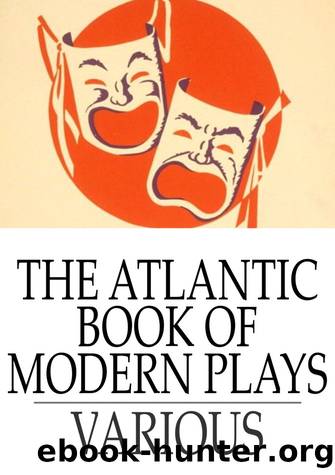The Atlantic Book of Modern Plays by Various Sterling Andrus Leonard

Author:Various, Sterling Andrus Leonard
Language: eng
Format: epub
ISBN: 9781776679133
Publisher: The Floating Press
The Captain of the Gate[10] by Beulah Marie Dix
*
SCENE: In the cheerless hour before the dawn of a wet spring morning five gentlemen-troopers of the broken Royalist army, fagged and outworn with three long days of siege, are holding, with what strength and courage are left them, the Gatehouse of the Bridge of Cashala, which is the key to the road that leads into Connaught. The upper chamber of the Gatehouse, in which they make their stand, is a narrow, dim-lit apartment, built of stone. At one side is a small fireplace, and beside it a narrow, barred door, which leads to the stairhead. At the end of the room, gained by a single raised step, are three slit-like windows, breast-high, designed, as now used, for defense in time of war. The room is meagrely furnished, with a table on which are powder-flask, touch-box, etc., for charging guns, a stool or two, and an open keg of powder. The whole look of the place, bare and martial, but depressed, bespeaks a losing fight. On the hearth the ashes of a fire are white, and on the chimneypiece a brace of candles are guttering out.
The five men who hold the Gatehouse wear much soiled and torn military dress. They are pale, powder-begrimed, sunken-eyed, with every mark of weariness of body and soul. Their leader, JOHN TALBOT, is standing at one of the shot-windows, with piece presented, looking forth. He is in his mid-twenties, of Norman-Irish blood, and distinctly of a finer, more nervous type than his companions. He has been wounded, and bears his left hand wrapped in a bloody rag. DICK FENTON, a typical, careless young English swashbuckler, sits by the table, charging a musket, and singing beneath his breath as he does so. He, too, has been wounded, and bears a bandage about his knee. Upon the floor (at right) KIT NEWCOMBE lies in the sleep of utter exhaustion. He is an English lad, in his teens, a mere tired, haggard child, with his head rudely bandaged. On a stool by the hearth sits MYLES BUTLER, a man of JOHN TALBOT'S own years, but a slower, heavier, almost sullen type. Beside him kneels PHELIMY DRISCOLL, a nervous, dark Irish lad, of one and twenty. He is resting his injured arm across BUTLER'S knee, and BUTLER is roughly bandaging the hurt.
For a moment there is a weary, heavy silence, in which the words of the song which FENTON sings are audible. It is the doleful old strain of "the hanging-tune."
FENTON (singing).
Fortune, my foe, why dost thou frown on me,
And will thy favors never greater be?
Wilt thou, I say, forever breed me pain,
And wilt thou not restore my joys again?
BUTLER (shifting DRISCOLL'S arm, none too tenderly). More to the light!
DRISCOLL (catching breath with pain). Ah! Softly, Myles!
JOHN TALBOT (leaning forward tensely). Ah!
FENTON. Jack! Jack Talbot! What is it that you see?
JOHN TALBOT (with the anger of a man whose nerves are strained almost beyond endurance). What should I see but Cromwell's
Download
This site does not store any files on its server. We only index and link to content provided by other sites. Please contact the content providers to delete copyright contents if any and email us, we'll remove relevant links or contents immediately.
Cecilia; Or, Memoirs of an Heiress — Volume 2 by Fanny Burney(31956)
Cecilia; Or, Memoirs of an Heiress — Volume 3 by Fanny Burney(31942)
Dialogue by Robert McKee(4405)
The 101 Dalmatians by Dodie Smith(3511)
Bound by Hatred (The Singham Bloodlines Book 2) by MV Kasi(3086)
The Art of Dramatic Writing: Its Basis in the Creative Interpretation of Human Motives by Egri Lajos(3068)
Harry Potter and the Cursed Child - Parts One and Two by John Tiffany(3045)
The Beautiful Boys: A High School NA Reverse Harem Paranormal Bully Romance (Shadowlight Academy Book 1) by Gow Kailin(2868)
Angels in America by Tony Kushner(2662)
Carrie's War by Nina Bawden(2469)
A Clockwork Orange by Anthony Burgess(2468)
Unlaced by Jaci Burton & Jasmine Haynes & Joey W. Hill & Denise Rossetti(2375)
The Femme Playlist & I Cannot Lie to the Stars That Made Me by Catherine Hernandez(2293)
Open Book by Jessica Simpson(2267)
Drama by John Lithgow(2235)
Outside Woman (BWWM Amish Romance) by Stacy-Deanne(2121)
Terrorist Cop by Mordecai Dzikansky & ROBERT SLATER(2080)
Yerma by Federico García Lorca(2071)
Leo's Desire by Sundari Venkatraman(1932)
